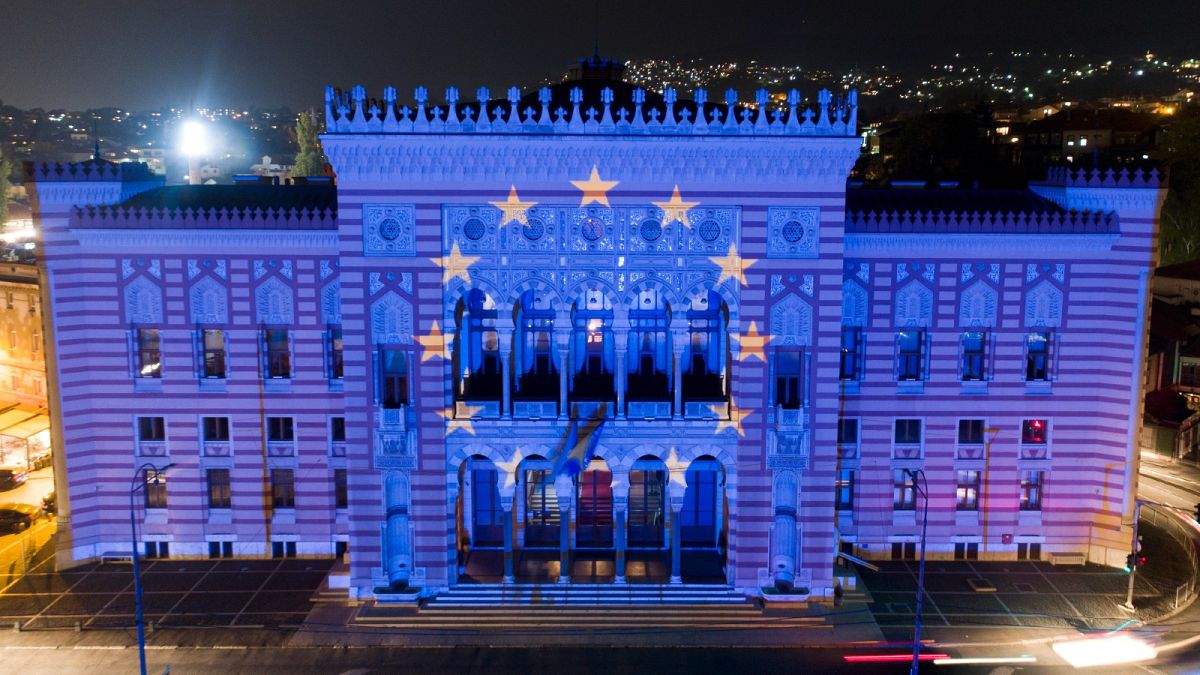Candidate status is a largely symbolic designation which recognises that the small Balkan country of 3.5 million is on track to begin the lengthy and complex accession process.
European Union ministers on Tuesday endorsed giving Bosnia and Herzegovina the status of being a candidate to join the bloc.
The decision has to be approved by the leaders of the EU's 27 members, who will gather in Brussels for a summit on Thursday.
"This sends a strong signal to the Western Balkan region and above all, to the citizens of Bosnia and Herzegovina," Austrian EU minister Karoline Edtstadler wrote on Twitter.
Bisera Turković, Bosnia's Deputy Chairperson of the Council of Ministers and Minister of Foreign Affairs described the decision as a "huge, historic move towards EU membership".
"It is also a recognition of the enormous effort that has been invested in order to fulfill the conditions, but to a large extent also in the struggle to present the truth about the situation in Bosnia to the EU countries and to stop all attempts to jeopardise the already achieved progress."
"For the state, this will mean the opening of new channels of cooperation with the EU, new financial funds and investments," she said.
A long time coming?
Candidate status is a largely symbolic designation which recognises that Bosnia and Herzegovina is on track to begin the lengthy and complex accession process.
It does not, for instance, automatically trigger the start of negotiations.
But it nonetheless represents a boost for the small country of 3.5 million inhabitants, which applied to join in 2016 and has been designated as a potential candidate since then.
It has been a bumpy ride for Bosnia so far, with the Commission stressing in its 2019 Opinion that the country needed to make progress on 14 key priority areas before advancing further in the EU membership process.
Following a summit with Western Balkan countries in June, the bloc's leaders said that they stood ready to endorse candidate status but called on the European Commission to issue an assessment on the implementation of the 14 priorities.
The Commission's report, released in October, detailed "limited progress" on reforms pertaining to the public administration and "no progress" in strengthening the judiciary and the fight against corruption and organised crime, among other issues.
It also noted that Bosnia "needs to significantly step up alignment with the EU acquis," or the collection of common rights and obligations that constitute the body of EU law.
'Europe delivers'
The 1995 Dayton Accords, which put an end to a three-and-a-half-year interethnic war, split the country into two main administrative units or entities — the Federation of Bosnia and Herzegovina and the Republika Srpska — and an umbrella state-level government, with power shared among the three constituent peoples: Bosniaks, Croats and Serbs.
This power-sharing agreement has led to political instability in the country.
For instance, the EU's executive stated that until spring 2022, political parties based in the Republika Srpska, or RS, blocked legislative and executive institutions at the state level and adopted initiatives to unilaterally take over state competencies at the entity level. in breach of the constitutional and legal order.
They also "obstructed the implementation of EU restrictive measures on Russia with which Bosnia and Herzegovina had formally aligned."
A general election on 2 October led to weeks of haggling and tradeoffs between the winning parties, with a broad ruling coalition formed late last month.
The so-called "Octet" has said it would place Euro-Atlantic integration, political stability, the rule of law, the economy and fulfilling the Commission's 14 priorities at the centre of its agenda.
Commissioner for Neighbourhood and Enlargement Olivér Várhelyi welcomed the decision to grant candidate status, writing on Twitter: "Europe Delivers".
"EU path is open! We have high hope and expectations that 14 key priorities will be delivered for Bosnia and Herzegovina citizens’ benefit," he added.
Enlargement and relations with the Western Balkans have shot up higher on the bloc's agenda since Russia launched its full-scale invasion off Ukraine on 24 February in a bid to ensure neighbours align more closely with the EU.
Ukraine and Moldova were granted candidate status in record time, while negotiations with Albania and North Macedonia started after years of inaction and vetoes by two neighbouring member states, Greece and Bulgaria.
The bloc has also opened some of its programmes, traditionally only for members, to Western Balkans countries and pledged billions of euros in assistance to boost energy and economic ties.
